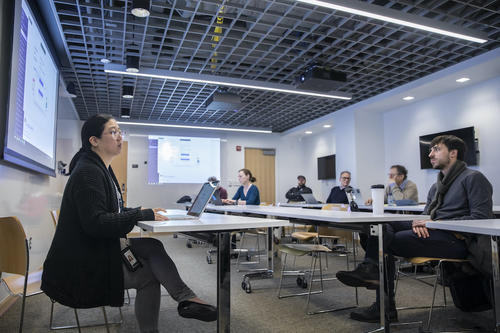
Faced with a prolonged disruption due to COVID-19, Yale has taken measures to safeguard its community, establish new protocols for teaching students remotely, and maintain core campus functions and facilities.
University leadership, following the advice of Yale’s own relevant experts, announced March 14 that all classes will move online for the duration of the spring semester. The decision came after a member of the Yale community tested positive for the virus in a preliminary test, and it has been followed by an increase in infection in Connecticut and nationally.
“As we work through this time together, I ask you to take care of yourselves and each other — and to let Yale help you do that,” President Peter Salovey wrote in an email to the Yale community.
(See the president’s latest YaleNews Q&A.)
Early last week, while most students were on spring break, personnel across Yale began mobilizing to help undergraduates still on campus travel home. They also began arranging housing, meals and continued health services for students with no place to go.
In parallel, the university has been making arrangements and accommodations for graduate and professional students, while mounting an intensive effort to train faculty for online instruction.
The spread of COVID-19, which has reached pandemic proportions, continues to surge. According to the Centers for Disease Control and Prevention, there were 3,487 confirmed or presumptive cases in the United States as of midday March 16. The federal government has declared a state of national emergency in order to deal with the virus.
Visit Yale’s primary COVID-19 information page.
Chief among Yale’s priorities is student safety.
The university has booked about 170 flights for students returning home, and is paying the travel expenses of all undergraduates on financial aid. Yale will reimburse such students who made their own arrangements. By Monday, all but about 200 Yale College students had left campus. For those still here, the university is providing housing, food and healthcare.
Residential college heads and deans have been central to the effort, and remain undergraduates’ primary point of contact for assistance. The College’s FAQ page, regularly updated, addresses many pressing questions.
“You’ve been exceptionally patient and understanding, for which I want to express my appreciation and admiration,” Yale College Dean Marvin Chun said in an email to undergraduate students on March 15. “I also want to say how sad I feel that your semester has been uprooted this way — although I am confident we will get through this, I know that it is with much uncertainty, disappointment, and sacrifice.”
For undergraduates who have already left New Haven, the university is preparing to identify and ship critical belongings still inside their rooms — particularly items necessary to their coursework and projects.
The needs of Yale’s graduate and professional students are also top of mind.
Stipends for Ph.D students are continuing to be paid in full and on schedule, and deadlines for dissertations and other academic obligations are being adjusted as needed. International students expected to arrive on campus in April have for now had their start dates rescheduled to June 1.
Graduate students are encouraged to consult an FAQ page prepared for them.
“I want the graduate students to know that their safety and well-being are my first priorities,” said Graduate School Dean Lynn Cooley. “We are here for them every step of the way to ensure that they get everything they can out of this time. When the crisis has subsided, I expect we’ll emerge from this together unified, determined, and in awe of our ability to adapt in the most unsettling circumstances.”
Each of Yale’s professional schools is also working hard to address the needs of its students. This includes supporting their academic programs and research requirements, as well as providing travel and logistical assistance as necessary. More information is available on each school’s website.
As Yale moves forward, there will be one dining hall, at Trumbull College, preparing meals to go for students. In addition, Yale Dining will deliver to-go meals to other campus locations, such as the School of Management, Yale Divinity School, Yale’s West Campus, and Yale Medical School.
Yale Dining has reduced staffing levels in order to ensure the health and safety of Yale staff while providing these services.
“We’ve been planning this for weeks, and the model changes as we get new information,” said Adam Millman, senior director of Yale Dining.
With online instruction scheduled to start March 23, the university’s Poorvu Center for Teaching and Learning has been training professors in every academic discipline, who will soon be teaching thousands of courses online that were originally designed for a classroom setting.
Center personnel, with help from colleagues in Yale Information Technology Services and the Yale University Library, last week hosted ten in-person training sessions for professors and other Yale instructors. Professors received instruction in the learning management system Canvas and the video conferencing technology Zoom.
To comply with intensifying social distancing guidelines, faculty training is now taking place remotely, with online sessions and individual phone consultations. About 600 faculty and instructors have consulted with the Poorvu Center to date.
The Poorvu Center on March 16 launched a microsite aimed at promoting academic continuity while students are away from campus. It offers access to resources for facilitating a rich remote educational experience.
Meanwhile, Yale continues to carry out the vital, ongoing functions at the university.
Essential personnel remain on campus to deliver patient and student care, support research, network and data centers, and maintain public safety. Key staff are also on campus to facilitate and support the transition to online teaching and learning activities.
“Amid unprecedented circumstances, Yale scholars are bringing rigor, enthusiasm and creativity to the task of fulfilling the university’s core mission — the exchange and examination of ideas,” said Provost Scott A. Strobel. “With the support of the university’s first-rate educational technology and faculty development teams, we will continue to provide our students with an intellectual experience worthy of Yale.”
